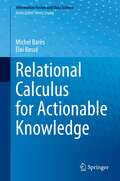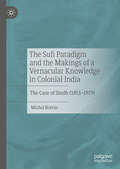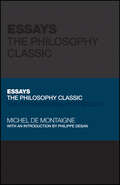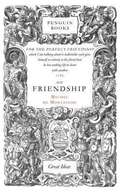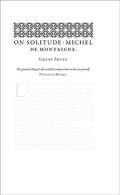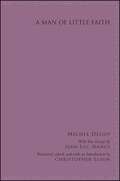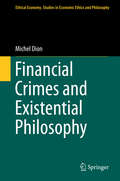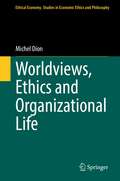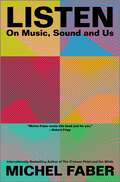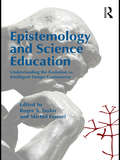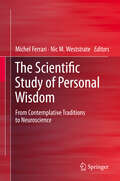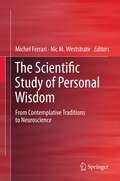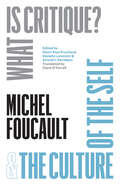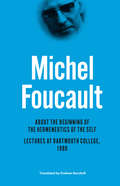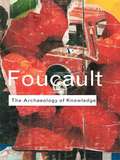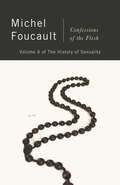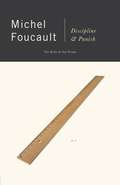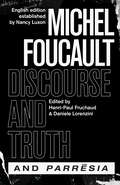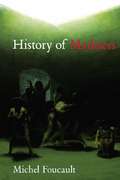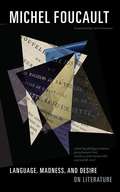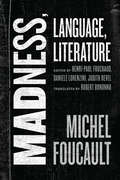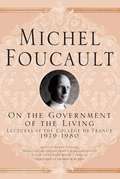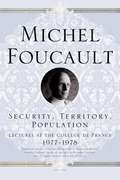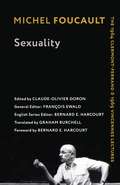- Table View
- List View
Relational Calculus for Actionable Knowledge (Information Fusion and Data Science)
by Éloi Bossé Michel BarèsThis book focuses on one of the major challenges of the newly created scientific domain known as data science: turning data into actionable knowledge in order to exploit increasing data volumes and deal with their inherent complexity. Actionable knowledge has been qualitatively and intensively studied in management, business, and the social sciences but in computer science and engineering, its connection has only recently been established to data mining and its evolution, ‘Knowledge Discovery and Data Mining’ (KDD). Data mining seeks to extract interesting patterns from data, but, until now, the patterns discovered from data have not always been ‘actionable’ for decision-makers in Socio-Technical Organizations (STO). With the evolution of the Internet and connectivity, STOs have evolved into Cyber-Physical and Social Systems (CPSS) that are known to describe our world today. In such complex and dynamic environments, the conventional KDD process is insufficient, and additional processes are required to transform complex data into actionable knowledge. Readers are presented with advanced knowledge concepts and the analytics and information fusion (AIF) processes aimed at delivering actionable knowledge. The authors provide an understanding of the concept of ‘relation’ and its exploitation, relational calculus, as well as the formalization of specific dimensions of knowledge that achieve a semantic growth along the AIF processes. This book serves as an important technical presentation of relational calculus and its application to processing chains in order to generate actionable knowledge. It is ideal for graduate students, researchers, or industry professionals interested in decision science and knowledge engineering.
The Sufi Paradigm and the Makings of a Vernacular Knowledge in Colonial India: The Case of Sindh (1851–1929)
by Michel BoivinThis book demonstrates how a local elite built upon colonial knowledge to produce a vernacular knowledge that maintained the older legacy of a pluralistic Sufism. As the British reprinted a Sufi work, Shah Abd al-Latif Bhittai's Shah jo risalo, in an effort to teach British officers Sindhi, the local intelligentsia, particularly driven by a Hindu caste of professional scribes (the Amils), seized on the moment to promote a transformation from traditional and popular Sufism (the tasawuf) to a Sufi culture (Sufiyani saqafat). Using modern tools, such as the printing press, and borrowing European vocabulary and ideology, such as Theosophical Society, the intelligentsia used Sufism as an idiomatic matrix that functioned to incorporate difference and a multitude of devotional traditions—Sufi, non-Sufi, and non-Muslim—into a complex, metaphysical spirituality that transcended the nation-state and filled the intellectual, spiritual, and emotional voids of postmodernity.
Thinking with Kant’s Critique of Judgment
by Michel ChaouliMichel Chaouli invites novice and expert alike to set out on the path of thinking, with help from Kant’s Critique of Judgment, about the force of aesthetic experience, the essence of art, and the relationship of beauty and meaning. Each chapter unfolds the significance of a key concept for Kant’s thought and our own ideas.
Essays: The Philosophy Classic (Capstone Classics)
by Michel De MontaigneAn essential companion to the most relevant works of Michel de Montaigne Essays: The Philosophy Classic delivers a carefully curated collection of thought-provoking works by sixteenth-century thinker Michel De Montaigne. Exploring topics as diverse as politics, poetry, love, friendship and the purpose of philosophy, this latest entry in the celebrated Capstone Classics series is accessible and intuitively organized. Follow the thoughts of the person who created the essay genre in literature as he expresses his philosophy, interests, and learning. Throughout, you’ll be guided by an expansive introduction by leading Montaigne scholar Philippe Desan and the comments of series editor Tom Butler-Bowdon, placing the work of Montaigne in its historical and philosophical context. You’ll also find: Celebrated and famous works by Montaigne, including noted classics like “That to Study Philosophy is to Learn to Die” Lesser-known works that have taken on increased importance in the unique context of the 21st-century A version of the popular Charles Cotton translation first published in 1685: a simple, faithful, and clear adaptation of the French originalAn invaluable resource for anyone interested in the insightful and illuminating work of one of the most enduring thinkers of the 16th-century, Essays: The Philosophy Classic is an essential addition to the libraries of philosophers, historians, and laypeople seeking an eye-opening and fascinating exploration of life itself.
On Friendship
by Michel De MontaigneThroughout history, some books have changed the world. They have transformed the way we see ourselves - and each other. They have inspired debate, dissent, war and revolution. They have enlightened, outraged, provoked and comforted. They have enriched lives - and destroyed them. Now Penguin brings you the works of the great thinkers, pioneers, radicals and visionaries whose ideas shook civilization, and helped make us who we are. Michel de Montaigne was the originator of the modern essay form; in these diverse pieces he expresses his views on relationships, contemplates the idea that man is no different from any animal, argues that all cultures should be respected, and attempts, by an exploration of himself, to understand the nature of humanity.
On Solitude
by Michel De MontaigneFor the true bibliophile and design-savvy book lover, here is the next set of Penguin's celebrated Great Ideas series by some of history's most innovative thinkers. Acclaimed for their striking and elegant package, each volume features a unique type-driven design that highlights the bookmaker's art. Offering great literature and great design at great prices, this series is ideal for readers who want to explore and savor the Great Ideas that have shaped our world.
A Man of Little Faith (SUNY series in Contemporary French Thought)
by Michel DeguyIn A Man of Little Faith the French poet and philosopher Michel Deguy reflects on the loss of religious faith both personally and culturally. Disenchanted not only with the oversimplifications of radical atheism but also with what he sees as an insipid sacralization of art as the influence of religion has waned, Deguy refuses to focus on loss or impossibility. Instead he actively suspends belief, producing a poetic deconstruction that, though resolutely a-theistic, makes a plea for an earthly piety and for the preservation of the relics of religion for the world to come. Two essays by Jean-Luc Nancy and a recent interview with Deguy are included, which reveal the impact and implications of Deguy's ongoing reflection and its significance within his generation of French thought.
Financial Crimes and Existential Philosophy
by Michel DionThe aim of this book is to deepen our understanding of financial crimes as phenomena. It uses concepts of existential philosophies that are relevant to dissecting the phenomenon of financial crimes. With the help of these concepts, the book makes clear what the impact of financial crimes is on the way a human being defines himself or the way he focuses on a given notion of humankind. The book unveils how the growth of financial crimes has contributed to the increase of the anthropological gap, and how the phenomenon of financial crimes now distorts the way we understand humankind. Using the existential philosophies of Kierkegaard, Nietzsche, Jaspers, Buber, Heidegger, and Marcel, the book sheds light on how these philosophies can help to better perceive and describe financial crimes. Next it looks at prevention strategies from an organizational perspective, using concepts of Sartre, Gadamer and Tillich. The book provides readers with existential principles that will help them be more efficient when they have to design and implement prevention strategies against corporate crime.
Worldviews, Ethics and Organizational Life (Ethical Economy #60)
by Michel DionThis book provides an innovative way to revisit the depth and scope of our moral/post-moral worldviews, while undertaking an ontic reflection about organizational life. The ontic dimension of life refers to existing entities’ lived experiences. It has nothing to do with psychological and relational processes. The ontic level of analysis mirrors a philosophical outlook on organizational life. Unlike moral worldviews, post-moral worldviews oppose the existence of Truth-itself. Post-moral worldviews rather imply that dialogical relationships allow people to express their own truth-claims and welcome others’ truth-claims. The purpose of this book is to explain the philosophical implications of moral and post-moral worldviews and the way to move from a moral to a post-moral worldview. Moreover, this book explores the possibility to transcend the moral/post-moral dualism, through moral deliberation processes and a reinterpretation of the Presence of the Infinite in all dimensions of human life. This book could eventually help to better grasp the basic philosophical challenges behind ethical reflection about organizational issues.
Listen: On Music, Sound and Us
by Michel Faber"I'm not here to change your mind about Dusty Springfield or Shostakovich or Tupac Shakur or synthpop. I'm here to change your mind about your mind." There are countless books on music with much analysis given to musicians, bands, eras and/or genres. But rarely does a book delve into what's going on inside us when we listen.Michel Faber explores two big questions: how do we listen to music and why do we listen to music? To answer these questions, he considers a range of factors, which includes age, illness, the notion of "cool," commerce, the dichotomy between "good" and "bad" taste and much more. From the award-winning author of The Crimson Petal and the White and Under the Skin, this idiosyncratic and philosophical book reflects Michel Faber's lifelong obsession with music of all kinds. Listen will change your relationship with the heard world.
Epistemology and Science Education: Understanding the Evolution vs. Intelligent Design Controversy
by Michel Ferrari Roger S. TaylorHow is epistemology related to the issue of teaching science and evolution in the schools? Addressing a flashpoint issue in our schools today, this book explores core epistemological differences between proponents of intelligent design and evolutionary scientists, as well as the critical role of epistemological beliefs in learning science. Preeminent scholars in these areas report empirical research and/or make a theoretical contribution, with a particular emphasis on the controversy over whether intelligent design deserves to be considered a science alongside Darwinian evolution. This pioneering book coordinates and provides a complete picture of the intersections in the study of evolution, epistemology, and science education, in order to allow a deeper understanding of the intelligent design vs. evolution controversy. This is a very timely book for teachers and policy makers who are wrestling with issues of how to teach biology and evolution within a cultural context in which intelligent design has been and is likely to remain a challenge for the foreseeable future.
The Scientific Study of Personal Wisdom
by Michel Ferrari Nic M. WeststrateThe rich and diverse contributions to this volume span a wide variety of disciplines, from psychology and philosophy to neuroscience, by some of the most influential scholars in the emerging science of personal wisdom. As such, it is a collection of essential readings and the first publication to integrate both the spiritual and pragmatic dimensions of personal wisdom. The content of the book goes beyond speculative theory to present a wealth of scientific research currently under way in this expanding field. It also describes numerous promising methods now being deployed in the quest for scientific knowledge of the elusive, yet critical, phenomenon of personal wisdom. The book is an excellent introduction to the field for novice researchers as well as a stimulating and enlightening resource for established experts. Its broad appeal makes it a vital addition to the libraries of academics and practitioners in many disciplines, from developmental psychology to gerontology and from philosophy to contemplative religious traditions such as Buddhism.
The Scientific Study of Personal Wisdom: From Contemplative Traditions to Neuroscience
by Michel Ferrari and Nicholas WeststrateThe rich and diverse contributions to this volume span a wide variety of disciplines, from psychology and philosophy to neuroscience, by some of the most influential scholars in the emerging science of personal wisdom. As such, it is a collection of essential readings and the first publication to integrate both the spiritual and pragmatic dimensions of personal wisdom.The content of the book goes beyond speculative theory to present a wealth of scientific research currently under way in this expanding field. It also describes numerous promising methods now being deployed in the quest for scientific knowledge of the elusive, yet critical, phenomenon of personal wisdom. The book is an excellent introduction to the field for novice researchers as well as a stimulating and enlightening resource for established experts. Its broad appeal makes it a vital addition to the libraries of academics and practitioners in many disciplines, from developmental psychology to gerontology, and from philosophy to contemplative religious traditions such as Buddhism.
"What Is Critique?" and "The Culture of the Self" (The Chicago Foucault Project)
by Michel FoucaultNewly published lectures by Foucault on critique, Enlightenment, and the care of the self. On May 27, 1978, Michel Foucault gave a lecture to the French Society of Philosophy where he redefined his entire philosophical project in light of Immanuel Kant’s 1784 text “What Is Enlightenment?” Foucault strikingly characterizes critique as the political and moral attitude consisting in the “art of not being governed like this,” one that performs the function of destabilizing power relations and creating the space for a new formation of the self within the “politics of truth.” This volume presents the first critical edition of this crucial lecture alongside a previously unpublished lecture about the culture of the self and three public debates with Foucault at the University of California, Berkeley, in April 1983. There, for the first time, Foucault establishes a direct connection between his reflections on the Enlightenment and his analyses of Greco-Roman antiquity. However, far from suggesting a return to the ancient culture of the self, Foucault invites his audience to build a “new ethics” that bypasses the traditional references to religion, law, and science.
About the Beginning of the Hermeneutics of the Self: Lectures at Dartmouth College, 1980
by Michel FoucaultIn 1980, Michel Foucault began a vast project of research on the relationship between subjectivity and truth, an examination of conscience, confession, and truth-telling that would become a crucial feature of his life-long work on the relationship between knowledge, power, and the self. The lectures published here offer one of the clearest pathways into this project, contrasting Greco-Roman techniques of the self with those of early Christian monastic culture in order to uncover, in the latter, the historical origin of many of the features that still characterize the modern subject. They are accompanied by a public discussion and debate as well as by an interview with Michael Bess, all of which took place at the University of California, Berkeley, where Foucault delivered an earlier and slightly different version of these lectures. Foucault analyzes the practices of self-examination and confession in Greco-Roman antiquity and in the first centuries of Christianity in order to highlight a radical transformation from the ancient Delphic principle of “know thyself” to the monastic precept of “confess all of your thoughts to your spiritual guide.” His aim in doing so is to retrace the genealogy of the modern subject, which is inextricably tied to the emergence of the “hermeneutics of the self”—the necessity to explore one’s own thoughts and feelings and to confess them to a spiritual director—in early Christianity. According to Foucault, since some features of this Christian hermeneutics of the subject still determine our contemporary “gnoseologic” self, then the genealogy of the modern subject is both an ethical and a political enterprise, aiming to show that the “self” is nothing but the historical correlate of a series of technologies built into our history. Thus, from Foucault’s perspective, our main problem today is not to discover what “the self” is, but to try to analyze and change these technologies in order to change its form.
Archaeology of Knowledge (Routledge Classics)
by Michel FoucaultIn France, a country that awards its intellectuals the status other countries give their rock stars, Michel Foucault was part of a glittering generation of thinkers, one which also included Sartre, de Beauvoir and Deleuze. One of the great intellectual heroes of the twentieth century, Foucault was a man whose passion and reason were at the service of nearly every progressive cause of his time. From law and order, to mental health, to power and knowledge, he spearheaded public awareness of the dynamics that hold us all in thrall to a few powerful ideologies and interests. Arguably his finest work, Archaeology of Knowledge is a challenging but fantastically rewarding introduction to his ideas.
Confessions of the Flesh: The History of Sexuality, Volume 4
by Michel FoucaultThe fourth and final volume in Michel Foucault&’s acclaimed History of Sexuality, completed just before his death in 1984 and finally available to the public One of the most influential thinkers of the twentieth century, Michel Foucault made an indelible impact on Western thought. The first three volumes in his History of Sexuality—which trace cultural and intellectual notions of sexuality, arguing that it has been profoundly shaped by the power structures applied to it—constitute some of Foucault&’s most important work. This fourth volume posits that the origins of totalitarian self-surveillance began with the Christian practice of confession. The manuscript had long been secreted away, in accordance with Foucault&’s stated wish that there be no posthumous publication of his unpublished work. With the sale of the Foucault archives in 2013, Foucault&’s nephew felt that the time had come to publish this final volume in Foucault&’s seminal history. Philosophically, it is a chapter in his hermeneutics of the desiring subject. Historically, it focuses on the remodeling of subjectivity carried out by the early Christian Fathers, who set out to transform the classical Logos of truthful human discourse into a theologos—the divine Word of a pure sovereign. What did God will in the matter of righteous sexual practice? Foucault parses out the logic of the various responses proffered by theologians over the centuries, culminating with Saint Augustine&’s fascinating discussion of the libido. Sweeping and deeply personal, Confessions of the Flesh is a tour de force from a philosophical master
Discipline and Punish: The Birth of the Prison
by Michel FoucaultIn this brilliant work, the most influential philosopher since Sartre suggests that such vaunted reforms as the abolition of torture and the emergence of the modern penitentiary have merely shifted the focus of punishment from the prisoner's body to his soul.
Discourse and Truth and Parresia (The Chicago Foucault Project)
by Michel Foucault“An invaluable book” of late-career lectures that reveal Foucault’s perspective on truth, truth-telling, and the nature of discourse (Choice).This volume collects a series of lectures given by the renowned French thinker Michel Foucault. The first part presents a talk, Parresia, delivered at the University of Grenoble in 1982. The second presents a series of lectures entitled “Discourse and Truth,” given at the University of California, Berkeley in 1983, which appears here for the first time in its full and correct form. Together, these lectures provide an unprecedented account of Foucault’s reading of the Greek concept of parresia, often translated as “truth-telling” or “frank speech.” The lectures trace the transformation of this concept across Greek, Roman, and early Christian thought, from its origins in pre-Socratic Greece to its role as a central element of the relationship between teacher and student. In mapping the concept’s history, Foucault’s concern is not to advocate for free speech; rather, his aim is to explore the moral and political position one must occupy in order to take the risk to speak truthfully.These lectures—carefully edited and including notes and introductory material to fully illuminate Foucault’s insights—are a major addition to Foucault’s English language corpus.
History of Madness: A History Of Insanity In The Age Of Reason (Routledge Classics Ser.)
by Michel FoucaultWhen it was first published in France in 1961 as Folie et Déraison: Histoire de la Folie à l'âge Classique, few had heard of a thirty-four year old philosopher by the name of Michel Foucault. By the time an abridged English edition was published in 1967 as Madness and Civilization, Michel Foucault had shaken the intellectual world. This translation is the first English edition of the complete French texts of the first and second edition, including all prefaces and appendices, some of them unavailable in the existing French edition. History of Madness begins in the Middle Ages with vivid descriptions of the exclusion and confinement of lepers. Why, Foucault asks, when the leper houses were emptied at the end of the Middle Ages, were they turned into places of confinement for the mad? Why, within the space of several months in 1656, was one out of every hundred people in Paris confined? Shifting brilliantly from Descartes and early Enlightenment thought to the founding of the Hôpital Général in Paris and the work of early psychiatrists Philippe Pinel and Samuel Tuke, Foucault focuses throughout, not only on scientific and medical analyses of madness, but also on the philosophical and cultural values attached to the mad. He also urges us to recognize the creative and liberating forces that madness represents, brilliantly drawing on examples from Goya, Nietzsche, Van Gogh and Artaud. The History of Madness is an inspiring and classic work that challenges us to understand madness, reason and power and the forces that shape them.
Language, Madness, and Desire: On Literature
by Michel FoucaultAs a transformative thinker of the twentieth century, whose work spanned all branches of the humanities, Michel Foucault had a complex and profound relationship with literature. And yet this critical aspect of his thought, because it was largely expressed in speeches and interviews, remains virtually unknown to even his most loyal readers. This book brings together previously unpublished transcripts of oral presentations in which Foucault speaks at length about literature and its links to some of his principal themes: madness, language and criticism, and truth and desire.The associations between madness and language—and madness and silence—preoccupy Foucault in two 1963 radio broadcasts, presented here, in which he ranges among literary examples from Cervantes and Shakespeare to Diderot, before taking up questions about Artaud&’s literary correspondence, lettres de cachet, and the materiality of language. In his lectures on the relations among language, the literary work, and literature, he discusses Joyce, Proust, Chateaubriand, Racine, and Corneille, as well as the linguist Roman Jakobson. What we know as literature, Foucault contends, begins with the Marquis de Sade, to whose writing—particularly La Nouvelle Justine and Juliette—he devotes a full two-part lecture series focusing on notions of literary self-consciousness.Following his meditations on history in the recently published Speech Begins after Death, this current volume makes clear the importance of literature to Foucault&’s thought and intellectual development.
Madness, Language, Literature (The Chicago Foucault Project)
by Michel FoucaultNewly published lectures by Foucault on madness, literature, and structuralism. Perceiving an enigmatic relationship between madness, language, and literature, French philosopher Michel Foucault developed ideas during the 1960s that are less explicit in his later, more well-known writings. Collected here, these previously unpublished texts reveal a Foucault who undertakes an analysis of language and experience detached from their historical constraints. Three issues predominate: the experience of madness across societies; madness and language in Artaud, Roussel, and Baroque theater; and structuralist literary criticism. Not only do these texts pursue concepts unique to this period such as the “extra-linguistic,” but they also reveal a far more complex relationship between structuralism and Foucault than has typically been acknowledged.
On the Government of the Living: Lectures at the College de France 1979-1980 (Michel Foucault, Lectures at the Collège de France)
by Michel Foucault Michel SenellartIn these lectures delivered in 1980, Michel Foucault gives an important new inflection to his history of "regimes of truth. " Following on from the themes of knowledge-power and governmentality, he turns his attention here to the ethical domain of practices of techniques of the self. <P><P>Why and how, he asks, does the exercise of power as government demand not only acts of obedience and submission, but "truth acts" in which individuals subject to relations of power are also required to be subjects in procedures of truth-telling? How and why are subjects required not just to tell the truth, but to tell the truth about themselves? <P><P>These questions lead to a re-reading of Sophocles'Oedipus the King and, through an examination of the texts of Tertullian, Cassian, and others, to an analysis of the 'truth acts' in early Christian practices of baptism, penance, and spiritual direction in which believers are called upon to manifest the truth of themselves as subjects always danger of falling into sin. In the public expression of the subject's condition as a sinner, in the rituals of repentance and penance, and in the detailed verbalization of thoughts in the examination of conscience, we see the organization of a pastoral system focused upon confession.
Security, Territory, Population: Lectures At The College De France, 1977-1978
by Michel FoucaultMarking a major development in Foucault's thinking, this book takes as its starting point the notion of "biopower," studying the foundations of this new technology of power over populations.
Sexuality: The 1964 Clermont-Ferrand and 1969 Vincennes Lectures (Foucault's Early Lectures and Manuscripts)
by Michel FoucaultMichel Foucault’s The History of Sexuality—the first volume of which was published in 1976—exerts a vast influence across the humanities and social sciences. However, Foucault’s interest in the history of sexuality began as early as the 1960s, when he taught two courses on the subject. These lectures offer crucial insight into the development of Foucault’s thought yet have remained unpublished until recently.This book presents Foucault’s lectures on sexuality for the first time in English. In the first series, held at the University of Clermont-Ferrand in 1964, Foucault asks how sexuality comes to be constituted as a scientific body of knowledge within Western culture and why it derived from the analysis of “perversions”—morbidity, homosexuality, fetishism. The subsequent course, held at the experimental university at Vincennes in 1969, shows how Foucault’s theories were reoriented by the events of May 1968; he refocuses on the regulatory nature of the discourse of sexuality and how it serves economic, social, and political ends. Examining creators of political and literary utopias in the nineteenth and twentieth centuries, from Sade to Fourier to Marcuse, who attempted to integrate “natural” sexualities, including transgressive forms, into social and economic life, Foucault elaborates a double critique of the naturalization and the liberation of sexuality. Together, the lectures span a range of interests, from abnormality to heterotopias to ideology, and they offer an unprecedented glimpse into the evolution of Foucault’s transformative thinking on sexuality.
